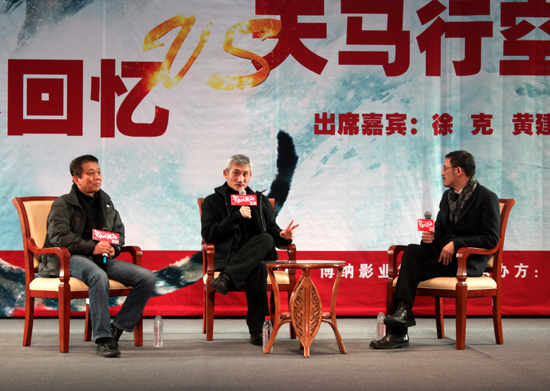Tsui Hark revives China's red classic
- By Zhang Rui
 0 Comment(s)
0 Comment(s) Print
Print E-mail China.org.cn, December 22, 2014
E-mail China.org.cn, December 22, 2014
Hong Kong filmmaker Tsui Hark told students at Beijing's Tsinghua University on Friday that his new movie, "The Taking of Tiger Mountain," has haunted him for 40 years.
As director Jiang Wen's much anticipated "Gone with the Bullets" met with heavy criticism and underperformance at box offices, audiences and theater managers have started to look for another savior of the movie season. The 3D film "The Taking of Tiger Mountain," which had a series of advanced screenings before its official Christmas Eve release, including one at Tsinghua, won thunderous applause from fans and critics for its vivid 3D visual effects and action-packed, well-crafted plotlines.
"I don't worry about whether the young generation will accept and like the movie," Tsui Hark said. "Making this movie is a wish that has haunted me for 40 years. I just ask myself to make a good film and share it with all of you."
The movie, produced by Bona Film Group, is based on the bestselling novel "Tracks in the Snowy Forest" by Qu Bo. It's a 1940s war story in which a communist spy named Yang Zirong uses his wit to infiltrate and defeat a heavily-armed group of bandits. Qu's novel was also famously adapted into the Peking opera "Taking Tiger Mountain by Strategy," initially by Shanghai Jingju Company, in 1958, making it into a new revolutionary classic. The book also inspired a 1970 film and three musical dramas produced in the late 1960s.
Tsui revealed that he was doing community service in New York’s Chinatown 40 years ago when the opera movie "Taking Tiger Mountain by Strategy" was screened. "Then I thought, ‘If I ever have a chance in the future to do anything related to filmmaking, I will turn this story into a new movie,’" he said. This memory inspired him to specially shoot and put a New York scene into the beginning of "The Taking of Tiger Mountain."
He said he read "Tracks in the Snowy Forest" after seeing the 1970 film and felt that the story was still relevant in modern times. At a 1992 gathering of Hong Kong and Chinese mainland filmmakers, director Xie Jin once asked him what kind of movie he wanted to do for mainland stories, and Tsui said he answered immediately, "Taking Tiger Mountain by Strategy!" At that time, Kung Fu megastar Jackie Chan was there too, and he said "I'm in!! I want the role of Yang Zirong!"
Although Jackie Chan eventually didn't end up with the leading role this time, Tsui decided to move forward with Chinese actor Zhang Hanyu as Yang Zirong and veteran Hong Kong actor Tony Leung Ka-fai as the villain Zuo Shandiao ("The Hawk"). Bona Film Group bought the rights to the novel in 2009, and they actually prepared for the movie for three years before the camera started rolling. Tsui even visited Qu's widow, Liu Bo, to learn more about her husband's military experience and the stories of the real people on which Qu based his characters, including himself and his wife. Liu was pleased with Tsui's vision and granted him full authority to adapt the novel into the movie.
Tsui and his whole crew, more than 1,100-strong at its largest, experienced great hardship during the making of the movie. They even went to north China to film real snow scenes, staying there for two and half months in freezing temperatures of negative 30 degrees Celsius.
"One day, big snow hit, the electrical power line broke, the hotel we stayed in lost heating, water -- our cell phones even lost signals. We were just trapped there," Huang Jianxin, the movie's producer, added.
Huang said he was initially worried about the movie’s box office performance but after seeing the final cut, he didn't worry at all. He also offered statistics showing that Chinese people are very familiar with the story: "It was reported that when the novel was adapted into the model Peking opera in the 1960s, the opera was viewed by 370 million people. If you multiply the 30 yuan ticket price by that number of viewers, can you get a hint of the box office results now!"
But Tsui and Huang were not just trying to make a good film and revive a red classic. They aimed for more: making a typical genre movie specifically for the Chinese market. They said they discussed the present and future of Chinese movies, and their conclusion is that the movies which are currently hottest in China are those that can provoke social discussion, debate and interest.
"It is a hidden worry for the Chinese movie industry in the future," Huang said, indicating that the Chinese market is very different from the United States, though Chinese box office revenues may surpass U.S. numbers in eight or ten years. "There are no genre movies, which are films made purely in a particular movie genre. So we made 'The Taking of Tiger Mountain' to serve as a perfect typical example."
"The Taking of Tiger Mountain" will hit Chinese cinemas on Dec. 24, 2014. Due to the good reviews and feedback from advanced screenings, Bona Film Group has already decided to allow earlier screenings, which means theaters can start showing the film at 5:00 p.m. on Dec. 23. Bona believes this move can generate more good reviews and promotion hype.







Go to Forum >>0 Comment(s)